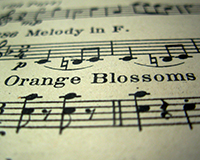 These words -- "in life, as in music, the pauses make all the difference" -- floated into my mind a few weeks back. I tweeted them on Twitter and started a post about them. The post has been saved as a draft since then, barely started and abandoned. Checking in with my drafts today, the words were quite welcome, as I am in a place where I need to pause. There have simply been too many things going on and my mind and body need a break. Reading these words was a good reminder, since everything in our culture demands that we constantly do, do, do, and then do some more.
We think that when we pause -- whether for a brief break or a week-long retreat -- we are losing time that could be used productively. We think we're making progress when we're in motion -- moving forward, as it were, on our way to our goal. In reality, it's often when we pause that the most progress is made. It's common wisdom that discoveries are made and insights come when we stop working on something and let it go. Inspiration and insight spring from deep within. They can't be reached through mental focus, thinking and logic. They are accessed when the mind is relaxed and creativity can flow.
These words -- "in life, as in music, the pauses make all the difference" -- floated into my mind a few weeks back. I tweeted them on Twitter and started a post about them. The post has been saved as a draft since then, barely started and abandoned. Checking in with my drafts today, the words were quite welcome, as I am in a place where I need to pause. There have simply been too many things going on and my mind and body need a break. Reading these words was a good reminder, since everything in our culture demands that we constantly do, do, do, and then do some more.
We think that when we pause -- whether for a brief break or a week-long retreat -- we are losing time that could be used productively. We think we're making progress when we're in motion -- moving forward, as it were, on our way to our goal. In reality, it's often when we pause that the most progress is made. It's common wisdom that discoveries are made and insights come when we stop working on something and let it go. Inspiration and insight spring from deep within. They can't be reached through mental focus, thinking and logic. They are accessed when the mind is relaxed and creativity can flow.
Pauses refresh and renew, hence they actually contribute to our productivity. But even more important, they bring balance and an enjoyable rhythm to life. We can't live at all without the long pause of sleep or even the tiny pause between the breaths. Pauses give life. Why not honor and allow ourselves to relax into them completely? Today, instead of lamenting the fact that I need to take some time off, I'm relishing the hours ahead. And when I've had enough r and r, I'll relish plunging back into work.
In music, it's the pauses that make the rhythms. It's in the pauses that the notes settle in and have time to reverberate in our hearts. It's in life's pauses that we find the silent background of our being. Today I shall delight in pauses!





